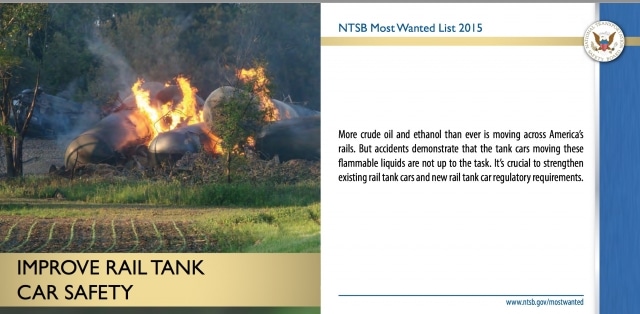Sen. John Thune (R-SD), chairman of the Senate Committee on Commerce, Science, and Transportation, recently got a bit overzealous in stumping for the oil and rail industries at a Jan. 28 hearing on freight rail challenges.
Thune stated that he believes the timeline in the proposed rule to retrofit and replace the dangerous DOT-111 tank cars used to carry oil by rail is “unattainable.” These are the same DOT-111 tank cars that were first called unsafe by the National Transportation Safety Board (NTSB) over 20 years ago.
But simply giving the industry decades to respond to safety concerns wasn’t enough for Thune. Apparently Thune failed to read the proposed regulations he was criticizing when he made the following statement, “The DOT [Department of Transportation] issued this proposed rule without analyzing the potential tank car shop capacity needed to retrofit or replace over 100,000 DOT-111 tank cars.”
Here are some excerpts from those proposed regulations.
Based on the RSI’s [Railway Supply Institute’s] presentation to the NTSB on tank car production capacity, it is anticipated that 33,800 tank cars could be manufactured per year. In addition, PHMSA [Pipeline and Hazardous Materials Safety Administration] assumes that the current fleet size in HHFT [high-hazard flammable trains] service is 72,000. PHMSA used this data to provide a phase out period for DOT [Department of Transportation] Specification 111 tank cars in certain HHFT service that would ensure that sufficient time was provided to avoid a fleet shortage in HHFT service.
It would appear that the DOT did actually analyze capacity in their proposed rule. Additionally, the proposed rule includes the following.
Further, Greenbrier is of the opinion that the ten-year timeline suggested by RSI is excessive and unmodified tank cars could and should be removed from hazardous materials service much sooner.
Greenbrier is one of the largest manufacturers of tank cars in the country. They probably have a better idea about shop capacity than Senator Thune. More recently, Gannett reported that Greenbrier’s chief engineer, Gregory Saxton, has commented on the industry’s capacity to retrofit and replace the existing DOT-111 fleet.
“We think this industry has an amazing capacity to build more cars,” Saxton said. “If the demand is there, we’ll meet it.”
In another interview, Saxton provided more insight. “If you set a 10-year deadline, it will take 10 years. We think that it can be done faster. We don’t want to see more Lac-Megantics.”
Each year, the NTSB publishes a list of its “Most Wanted” safety improvements. This year, rail tank safety was on the list and the NTSB echoed what it has said for over twenty years — “accidents demonstrate that the DOT-111 tank cars moving these flammable liquids are not up to the task.”
Another item on the NTSB’s most wanted list this year is positive train control (PTC) — a safety measure first recommended by the NTSB 45 years ago in 1970. By Congressional mandate, the industry must implement PTC on all trains by the end of 2015.
Senator Thune also had thoughts on the PTC safety deadline and he summed them up using the same word as he does for the rail car deadline: “unattainable.”
In Sen. Thune’s world, despite 45 years of safety recommendations and even Congressional mandates, anything he thinks the industry doesn’t want to have to implement is deemed “unattainable.”
“Without question, we must improve the safety of our nation’s rail system but I am concerned about the unattainable deadlines the rule proposes,” Thune said at the recent hearing.
Without question, Sen. Thune and his industry-friendly colleagues are putting oil and rail industry profits ahead of public safety. And it isn’t just the Republicans playing this game.
Almost a year ago, Columbia University professor Jason Bordoff did an excellent job of summing up the reality of the new regulations for Fuelfix.
“It’s easy to see where the government could have overreacted to some of the large accidents,” Bordoff said at the IHS CERAWeek energy summit in Houston. “I actually think they’ve been quite restrained in saying ‘we do want to understand this,’ in recognizing there are tradeoffs here in terms of new regulations and what costs they impose and what that might mean for the cost of transporting oil.”
Bordoff is the director for the Columbia Center for Global Energy Policy, formed in 2013. Prior to that his job title in the Obama Administration was Special Assistant to the President. If anyone should have an understanding of how the Obama administration has been “restrained” in understanding the industry’s concerns, it should be Bordoff.
DeSmog previously detailed how the industry has had a direct hand in private meetings with regulators in the White House about its concerns regarding new oil-by-rail regulations. Based on the notes released to the public from those meetings, one thing is clear. Without question, profits must be protected above all else.
It would seem that the only thing “unattainable” right now is a rapid transition to safer oil-by-rail transport.
Image credit: NTSB
Subscribe to our newsletter
Stay up to date with DeSmog news and alerts






